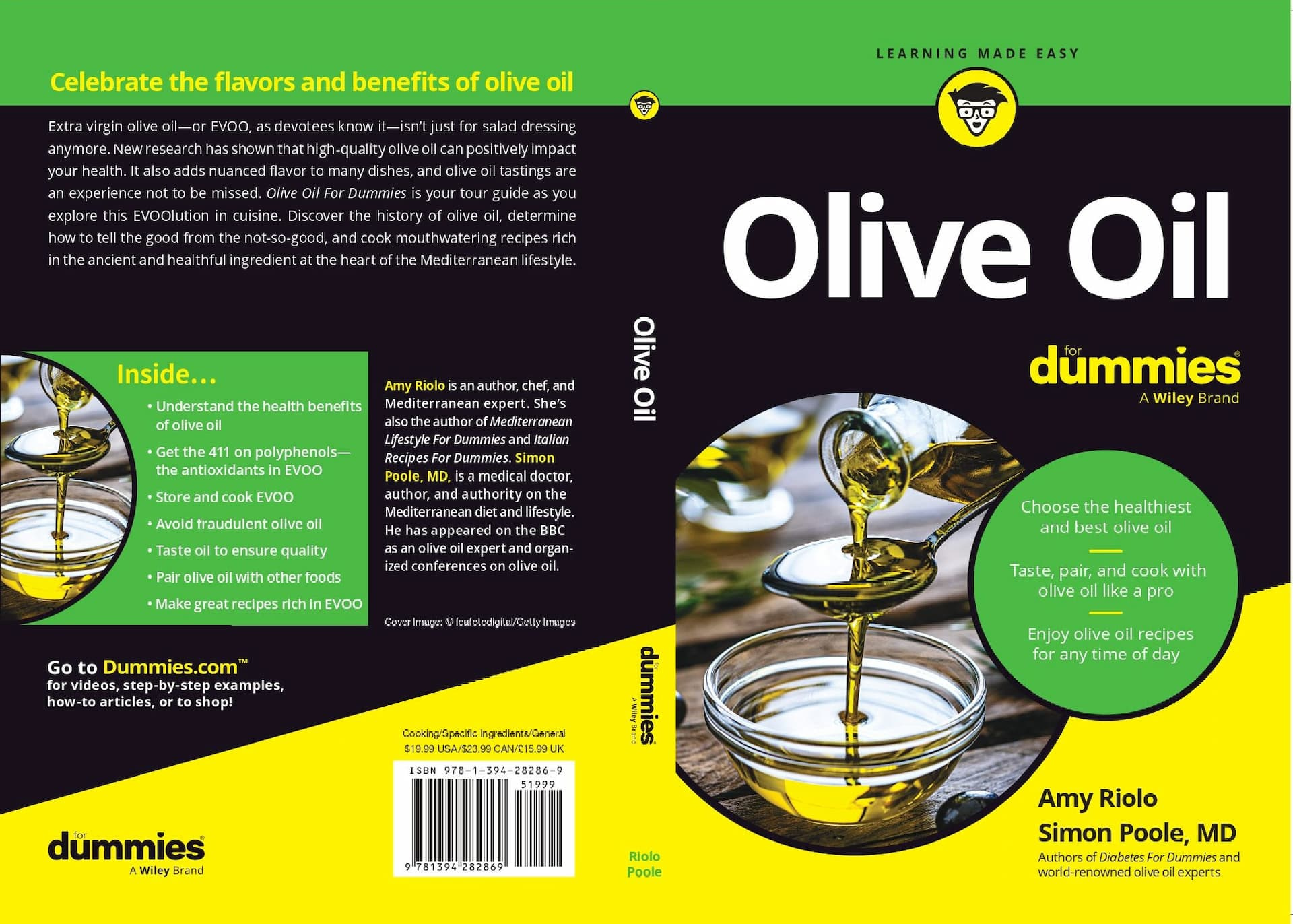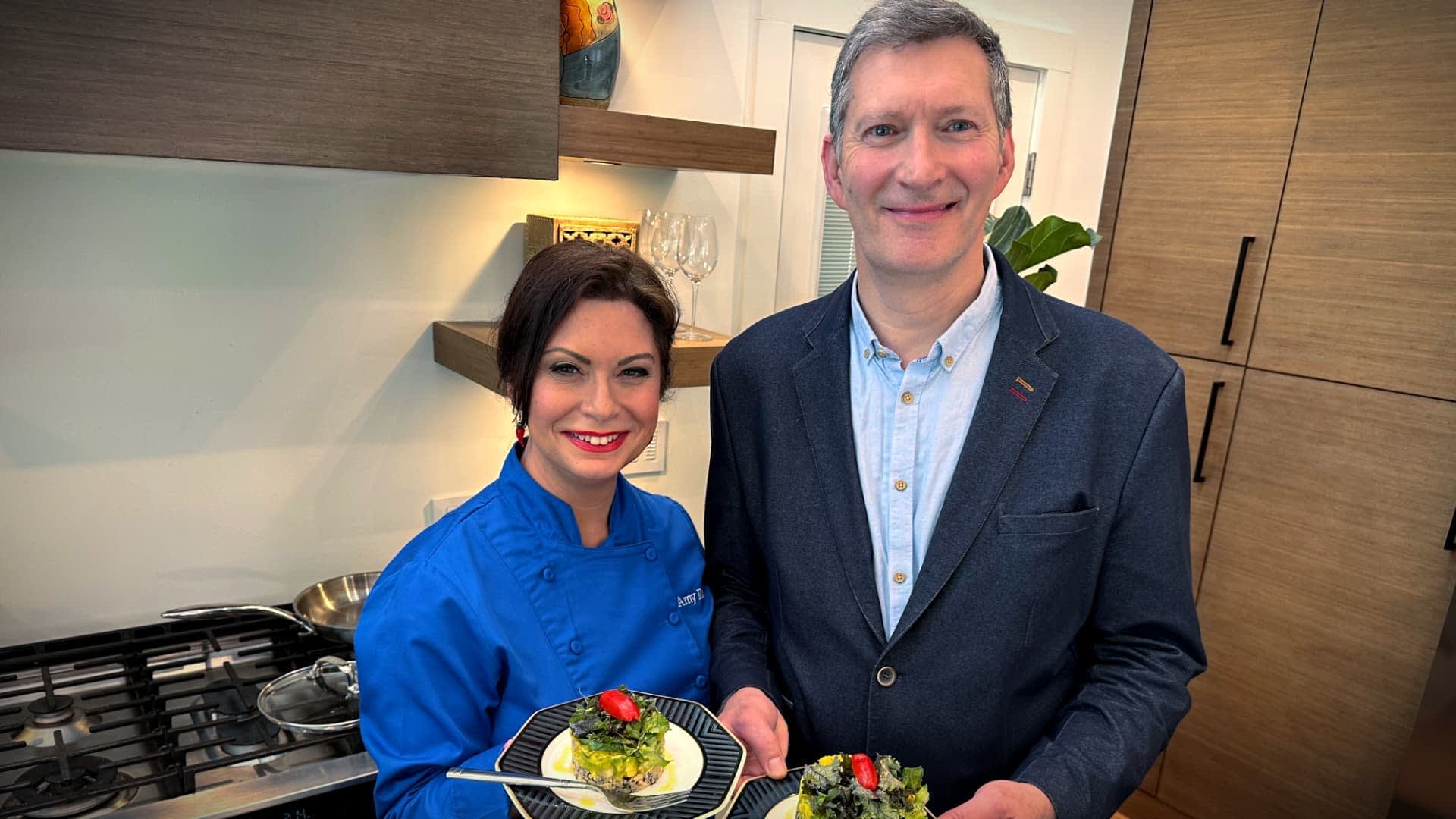Olive Oil for Dummies is the latest addition to the For Dummies franchise, a popular instructional and reference book series with over 6,000 titles, including 80 dedicated to food and cooking.
Co-authors Simon Poole and Amy Riolo, who have a long history of writing about olive oil, said the time had come to publish an easy-to-understand and comprehensive resource on the topic.
Despite its playful and cheeky titles, For Dummies translates quite complicated scientific concepts in a very understandable and respectful way to a general readership.
Poole, a medical doctor who has extensively studied the health benefits of olive oil, and Riolo, an award-winning chef specializing in cooking with olive oil, previously collaborated on three For Dummies books about diabetes.
“Despite its playful and cheeky titles, For Dummies translates quite complicated scientific concepts in a very understandable and respectful way to a general readership,” Poole said.
He and Riolo believe the book is a suitable messenger at a time when influencers and online commentators are discussing the olive oil world and health benefits with their audiences, sometimes spreading misinformation.
See Also:New Book Serves as Daily Guide for Following the Mediterranean Diet“It was really important to give a general audience a broad perspective on some of the detailed science and also to provide them with some wonderful recipes,” Poole said.
“We wanted to write that one book that could be a resource for everybody,” Riolo added.
The co-authors credited Leandro Ravetti, the head of the Australia-based Modern Olives technical team and co-chief executive of Cobram Estate, for his role as the book’s technical editor.
“He is so widely respected in the olive oil world,” Poole said. “We have been very fortunate to have his input and that of the other experts at the Olive Wellness Institute.”
Olive Oil for Dummies covers similar ground to an introductory olive oil course in 288 pages. It includes information about olive oil grades, different production methods, history and lore, health benefits, common myths, tips for buying and storing olive oil, and 40 recipes.

Olive Oil for Dummies goes on sale in October and is already available for pre-order.
Poole and Riolo emphasized that the book will provide plenty of practical advice for consumers who may know little, if anything, about olive oil.
“We have a whole chapter on the labels, how to read them and what people should look for,” Riolo said.
For example, the chapter explains the relevance of harvest dates and why they are more informative than expiration or best-before dates.
The authors also address the different types of quality certificates, including geographical indications and those administered by trade groups.
The chapter further discusses what organic olive oil means and defines common but confusing prefixes, such as ‘light’ and ‘first cold pressed,’ explaining their lack of relevance compared to ‘extra virgin,’ and ‘virgin.’
Another chapter explains how different transport and storage conditions impact olive oil quality over time, advising consumers to store it in a cool, dark place.
Poole and Riolo also spent considerable time dispelling common myths about olive oil in multiple sections of the book so readers would not be able to miss them.
Among the main ones is that olive oil cannot be used for frying. “That’s the big one: you can’t fry with olive oil or cook with olive oil; it can only be used raw,” said Riolo, pointing out that olive oil is safe to fry up to 410 ºF (210 ºC). “We don’t need to fry at temperatures above about 385 ºF (196 ºC),” she added.
The authors clarified this point in a section on dispelling myths and a section about cooking. “We were worried that if we just put it in one place, people would miss it,” Riolo said.
Another myth the authors work to dispel is that following the Mediterranean diet is expensive.
“It’s quite nice to illustrate that, for example, that a good quality extra virgin olive oil is often a similar amount to what people spend on a bottle of wine they might consume in an evening,” Poole said.
“But to get the recommended amount of extra virgin olive oil a day to achieve the Mediterranean diet, it costs less than a couple of cups of coffee from your favorite coffee house a week,” he added.
While Poole and Riolo dedicate most of the book to informing curious consumers, no book about olive oil is complete without a cooking section.
“All of the recipes use olive oils from all of the continents,” Poole said. “We use individual oils and briefly describe them. Of course, we say that you can use other olive oil. Still, we like highlighting and citing examples of great quality extra virgin olive oils from various places worldwide and acknowledge their producers.”
Poole and Riolo discuss the different olive varieties in the context of cooking, highlighting the range of cultivars grown across the olive oil world and their distinctive organoleptic qualities.
“We try to get the heavy hitters from all countries that produce olive oil,” Riolo said. “This shows the impact that olive oil has in the world and not just here where it originated.”
Ultimately, Poole and Riolo hope that Olive Oil for Dummies, which goes on sale in October and is already available for pre-order, will be an accessible entry point for anyone interested in olive oil.
“We are introducing our readers to how to taste at home; how to become familiar with the different tastes of extra virgin olive oil and recognize an oil that’s lampante from one that tastes good,” Poole concluded.









